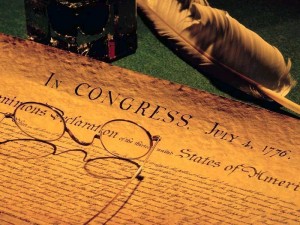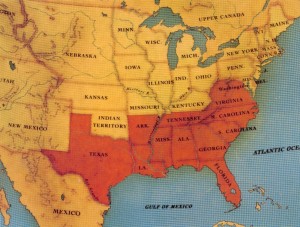I don’t think there’s really any disagreement about how pessimistic the majority of Americans are about the future. Currently, all the polls reveal that pessimism. As I survey the scene–the spiritual/moral, political, and cultural aspects [what does that leave?]–I have grave concerns as well. I’d like to offer a historian’s perspective.
Since I teach American history, I have a more in-depth knowledge of what has transpired previously. I can imagine myself transported back into earlier eras and think about how I might have felt about current events at those times. Bad moral climates, disunity, and devastating government policies have cropped up throughout our history.
 If my life had spanned the late colonial and revolutionary era, for instance, I would probably have been quite distressed over the state of affairs. The colonies had declared independence, and it was a thrilling prospect, but the progress of the war was anything but thrilling.
If my life had spanned the late colonial and revolutionary era, for instance, I would probably have been quite distressed over the state of affairs. The colonies had declared independence, and it was a thrilling prospect, but the progress of the war was anything but thrilling.
George Washington was often near despair over the inability of the Congress to pay his troops or provide for their needs. Thousands deserted during events such as Valley Forge. There was talk of meekly bowing to the British because all hopes for the future now appeared to be delusional. Even after achieving independence, the new states didn’t seem to want to work together; the entire national governmental structure was on the verge of collapse.
If I had experienced the 1790s, I would have been shocked by the vitriol that spewed forth daily in some of the newspapers, particularly those that accused Washington of wanting to set himself up as king. The French Revolution, which took place at that time, was one of the bloodiest episodes in all of history, and many in America were hailing it as a magnificent development. I would begin to question the wisdom of the electorate and wonder if this fledgling country could survive its first decade after the Constitution.
Later, during the War of 1812, our military defenses were so disorganized that the British actually burned Washington, DC, including the president’s house and the Capitol. Their troops were ravaging the countryside, destroying everything in their path without any effective countermeasures. What a low point for a nation.
 Then there’s the Civil War and the decade that led to it. Passions were so heated in Congress that representatives started bringing their weapons with them into the House and Senate for protection. Slavery, by this time, had become entrenched. The Founding Fathers had hoped to eliminate it, but now the South was proclaiming it to be a positive good from God.
Then there’s the Civil War and the decade that led to it. Passions were so heated in Congress that representatives started bringing their weapons with them into the House and Senate for protection. Slavery, by this time, had become entrenched. The Founding Fathers had hoped to eliminate it, but now the South was proclaiming it to be a positive good from God.
The nation split; more than 700,000 died in the war that followed, the highest tally for any American war. Bitterness remained for years afterward [you can still see its remnants today].
 The Progressive Movement, after the turn of the twentieth century, introduced more government involvement in people’s lives and decided that the Constitution was an outdated document that had to be reinterpreted. Woodrow Wilson, a racist and a eugenicist, took the presidency. The eugenics movement sought to limit who could have children; only the “best” should reproduce. This movement formed the cornerstone of Nazi policies in Germany later.
The Progressive Movement, after the turn of the twentieth century, introduced more government involvement in people’s lives and decided that the Constitution was an outdated document that had to be reinterpreted. Woodrow Wilson, a racist and a eugenicist, took the presidency. The eugenics movement sought to limit who could have children; only the “best” should reproduce. This movement formed the cornerstone of Nazi policies in Germany later.
Wilson moved the country down the path that led to Franklin Roosevelt’s New Deal in the 1930s: the fulfillment of progressive dreams as the government took charge of getting the nation out of the Great Depression. FDR’s policies were so ineffective that the Depression continued until WWII. If I had lived during those decades, I would have mourned the loss of Biblical principles and constitutional limitations. The reigning ideology tossed out the concept of the rule of law. Now, anything could happen.
I did live during the 1960s and 1970s. It was not pleasant. First was LBJ’s Great Society, which could be described as the New Deal on steroids, followed by the rancor of the Vietnam War, then Nixon’s Watergate fiasco, and finally, the debilitated presidencies of Ford and Carter. The economy was in the tank, the worst since the Great Depression. Along the way, we also concluded that innocent children in the womb could be murdered.
I say all of this to make this point: there have always been bad times. Quite often, those who believe in Biblical morality and constitutionalism have come to the edge of despair. Yet we are still here. There is still hope to turn things around. We survived the disunity of the Revolution and the Civil War. We overcame the disgrace of the burning of the nation’s capital. Calvin Coolidge reversed Woodrow Wilson’s policies and Jimmy Carter brought forth Ronald Reagan.
Will the disaster that is the Obama administration become a footnote in our history that will bring forth another resurgence of sanity, or have we turned a corner and lost our way forever? That page in our history has yet to be written. We are the ones who will write it. If we take our responsibility seriously, hope remains.
